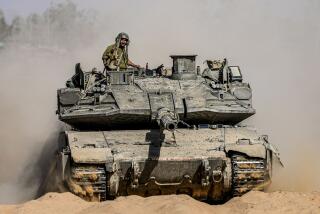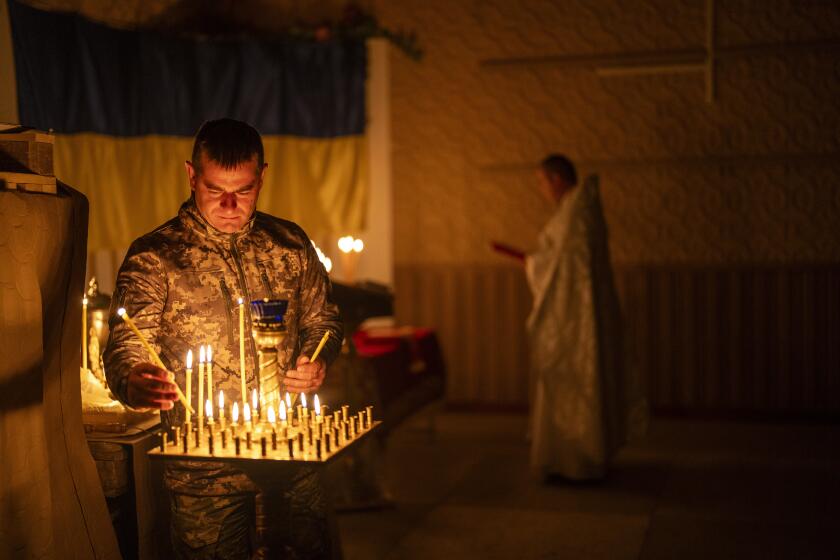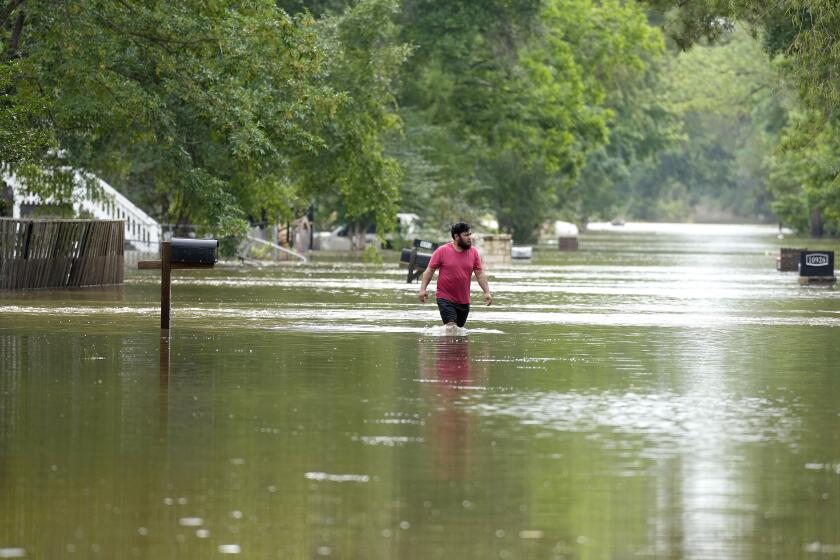Hope Dwindles as Troubles Retake Northern Ireland
The stolen picture of a smiling President Clinton is an apt symbol of this divided society’s slide from dreams of peace to echoes of war.
Until a few weeks ago, the picture hung on the wall at McErlean’s Bakery on Falls Road in the Roman Catholic heart of Belfast. It was there, on Nov. 30, 1995, that Irish republican leader Gerry Adams drank tea at a plastic table until it was time to shake hands with Clinton, who, in a meticulously contrived moment, just happened to spring from his limousine out front.
Buoyed by Clinton’s visit endorsing a cease-fire by the Irish Republican Army and Protestant militants, Northern Ireland applauded the prospects for a negotiated settlement after more than 25 years of sectarian violence.
No one knows who stole the picture from McErlean’s back room. And who stole the peace? Old adversaries argue anew, but the consequences are plain.
“People are scared all over again,” said a woman shopping at the bakery on a cold morning.
Amid renewed IRA bombings and fears that Protestant militants may be reaching for their guns again--and as residents commemorate the 25th anniversary of Londonderry’s “Bloody Sunday,” in which 14 Catholics were killed after British troops opened fire during a civil rights march--tragedy is being reborn in Northern Ireland.
Violence is accelerating, with the likelihood that it will get worse. And there is little prospect of a new political initiative until after British national elections this spring. If then.
“The genie is back out of the bottle. We’re looking once again at dangerous times,” said Adams, the contentious head of Sinn Fein, the political arm of the IRA. His encounter with Clinton was American benediction for Adams’ role as a peacemaker, but now his stock is low. There’ll be no visa for him to attend St. Patrick’s Day celebrations in the United States this year, as he did in 1995 and 1996.
Clinton, who threw U.S. clout and his own prestige behind the search for peace, has said he is “deeply outraged” by renewed IRA violence “that threatens to plunge Northern Ireland into a senseless spiral of violence.”
That is the way it seems to be headed. British army troopers dressed for war are back on downtown streets, dodging, spinning, dashing between cars stopped at red lights, startling visitors but never, deja vu, Belfasters. A failed mortar attack on an army patrol last week damaged the community center building where Clinton’s entourage lunched.
As ever, Belfast--gray, stolid, violent, but fetching nonetheless--is a grist of improbables. The city has a new, world-class $50-million concert hall, but tourism is dropping. The economy is still strong, but foreign investors are chary. Residents say that security concerns once again flavor family shopping and leisure decisions. Northern Ireland’s only safari park, in Ballymoney about 40 miles northwest of Belfast, is broke after a sharp decline in visitors.
“People’s attitudes have hardened; they have polarized,” said Patrick Mayhew, the British government’s minister for Northern Ireland.
In the absence of constructive new ideas, political rhetoric is bitter, accusatory and endlessly repetitive.
“There’s a new sadness here. People are saying, ‘Maybe peace was a hype,’ ” said Pat Dougan, the Catholic chairman of Mackie International Ltd. A manufacturer of textile machinery, Mackie stands along the ironically named “peace line” between majority Protestant and minority Catholic communities and employs workers from both.
Clinton made his keynote Northern Ireland address at the Mackie plant, imploring both communities to accept difficult sacrifices for peace. They haven’t.
“It is as if we have once again been dropped into an abyss. Nobody even knows if we are [at] war again,” Dougan said.
The IRA, which seeks union of six-county Northern Ireland with the Republic of Ireland, has commissioned quickening violence since it ended its cease-fire without warning Feb. 9, 1996, with a bombing that killed two men and did millions of dollars in damage in London’s Docklands. In June, a truck bomb savaged the heart of Manchester, injuring more than 200.
The IRA claimed responsibility for both attacks.
“We were betrayed by Sinn Fein/IRA, who said one thing while they were doing another,” says Prime Minister John Major. British officials, who won’t allow Sinn Fein to rejoin peace talks until the IRA surrenders its weapons, say the Catholic militants never seriously intended to discard violence or negotiate a peace that would require them to disarm.
Adams, by contrast, says Britain is to blame: Government bad faith and foot-dragging in refusing to accept Sinn Fein at peace talks are the root of new violence, he says.
Despite losses from arrests and police seizure of large quantities of arms and explosives here and on the British mainland, attacks mount, focused lately on police and soldiers in Northern Ireland itself.
A British army warrant officer was killed in an October bombing, and officers at the Royal Ulster Constabulary (RUC) say the police have been lucky to have escaped a fatality.
One policeman survived a homemade grenade thrown at his post outside the Belfast courthouse; others in an armored van saw a grenade whiz over their heads and explode against a grass embankment. On New Year’s Eve, police found a 1,000-pound bomb in a van near Belfast Castle, where a wedding reception was underway. The IRA claimed responsibility for that attack. And last weekend, three British soldiers escaped injury when a bomb destroyed their car.
By now, to the anguish of peace-seekers, Northern Ireland’s gossamer social fabric is shredded anew. Old wounds have festered since widespread violence occurred after police at first prohibited and then assisted obdurate Protestants in marching through protesting Catholic areas in the town of Drumcree last July. A U.S. State Department human rights report last week noted that many observers viewed that as “a victory of might over the rule of law,” which damaged the credibility of the RUC as an impartial police force.
Hopes that flared around Christmas for a renewed IRA cease-fire are now dead. “What is required is for Sinn Fein to be allowed into talks without any preconditions,” Adams has said repeatedly.
Supported--and often jostled--by the loyalist Protestant majority, the British government says the IRA can never shoot its way into peace talks.
“If you go on with your violence, you will never get the people of Northern Ireland down,” Mayhew told the IRA last week. “You will never be safe. In the end, you will spend long years of your lives in prison. . . . In your cruelty and folly, you excluded yourselves from the acceptance that others were willing to give you.”
If there is a fragile measure of comfort, it is that Protestant militants have not yet formally renounced their own cease-fire. There have been three bombing attacks against Catholics, but officially blaming them on renegades allows parties representing the principal loyalist militants to remain at peace talks overseen by Clinton envoy George J. Mitchell, the former Democratic majority leader of the U.S. Senate.
The laboriously assembled talks between nine remaining parties, the only structure for a negotiated peace, are deadlocked over the surrender of weapons and can have no meaningful future without Sinn Fein.
Protestant militants were killing more people than the IRA in the months before the 1994 cease-fires. If they now openly return to violence, the talks in all likelihood will be doomed. Some analysts, in fact, argue that the Protestant militants have effectively broken their cease-fire but that Britain will not say so to protect the talks, inviting accusations of a double standard.
As IRA pressure mounts, it seems more likely that open fighting will resume on oft-bloodied Belfast streets. A loyalist close to the Protestant militants said last week, “You can have no idea how hard it is to hold them back.”
So far, violence, casualties and government countermeasures are below the level seen before the cease-fires, but the upward trend is plain.
Still, under lengthening shadows, life goes on.
Violet Clarke, who sold Clinton flowers, apples and oranges, is back at her fruit stand along Shankill Road, the Protestant Main Street, after a winter holiday in the Canary Islands.
Franklin Hunter, a designer of wrought-iron furniture who made a shamrock-shaped peace candleholder for Clinton and named a chair after him, says business is not bad in Protestant East Belfast.
“There was a bright-looking future when Clinton was here, but I’m still optimistic,” said Hunter, 60, who was unemployed two years ago. “A lot of people are fed up with monosyllabic politicians. All they know how to say is, ‘No.’ What have they got to be afraid of?”
More to Read
Start your day right
Sign up for Essential California for news, features and recommendations from the L.A. Times and beyond in your inbox six days a week.
You may occasionally receive promotional content from the Los Angeles Times.






